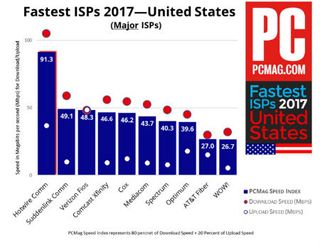Hotwire Has Fastest Wire Among ‘Major’ ISPs: PCMag Study

Hotwire Communications secured bragging rights as the fastest “major” U.S. ISP, according to a new study from PCMag that calculates both upstream and downstream speeds to come up with what it calls its “PCMag Speed Index.”
Among the majors, Hotwire’s PCMag Speed Index of 91.3 Mbps outpaced Suddenlink (now part of Altice USA), Verizon Fios, and Comcast, which dropped four spots compared to PCMag’s 2016 study, which had Comcast and Verizon Fios sharing the honors.
RELATED: Comcast, Verizon Fios Tie as Fastest ‘Major’ U.S. ISP: Study
PCMag called the latest round of results an “upset” because Fios had been toppled from the pedestal for the first time in seven years, but noted that Hotwire didn’t make earlier lists because it didn’t get enough tests to make the cut.
“Hotwire is a unique provider: It offers a 10-gigabit service called HotwireFision via fiber to the premises — and those premises are residential communities, be they for families, seniors, students, and some businesses,” the magazine noted in the study.
Google Fiber, meanwhile, stayed on top when all U.S. ISPs were factored in, with a speed index of 324.5 Mbps, ahead of EPB Fiber Optics (136.1 Mbps), Hotwire (91.3), Midco (83.6 Mbps), Grande Communications (71.8 Mbps), RCN (70.8 Mbps), Sonic (66.6 Mbps), Armstrong Cable (61.8 Mbps), Comporium (52.6 Mbps), Suddenlink (49.1 Mbps) and Verizon Fios (48.3 Mbps).
PCMag’s study also listed the fastest ISPs by region.
Multichannel Newsletter
The smarter way to stay on top of the multichannel video marketplace. Sign up below.
-Google Fiber was tops in the North Central U.S., followed by Midco and Mediacom Communications.
-RCN led the Northeast region, followed by Armstrong, Comcast and Verizon Fios.
-Comcast was the best in the Northwest, beating out Cable One, Wave Broadband and Charter Communications.
-Google Fiber also led the way in the South Central U.S., ahead of Grande Communications, Suddenlink, Comcast and Verizon.
-EPB Fiber Optics led in the Southeast, ahead of Hotwire, Comporium, Verizon and AT&T Fiber.
-Sonic was the speediest in the Southwest, edging out Cable One, Comcast, Charter and Cox Communications.
PCMag determined speed/throughput using data collected from user data collected from the publication’s Speed Test tool. After tabulating download and upload speed data, the study implements a weighted score that uses 80% of the download speed and 20% of the upload speed to generate the PCMag Speed Index.
Regarding the weighting, PCMag said it reasons that “downloads are at least 80 percent important to your using the web, we have arbitrarily decided.”
